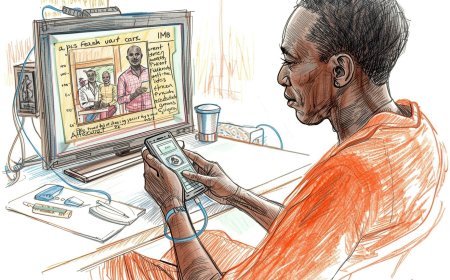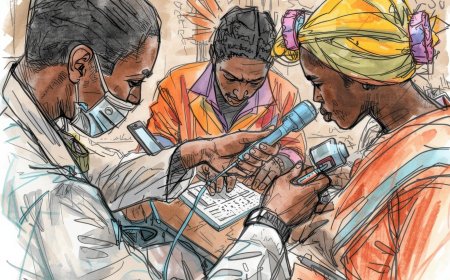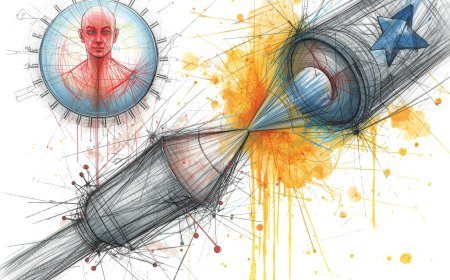The Humility Dividend: Why Ego is a Liability in Building a Resilient African Health-Tech Brand
A strategic guide for startup founders, innovators, and entrepreneurs in Africa's medical and healthcare industries. This article deconstructs the founder's ego, contrasting it with the communal philosophy of Ubuntu, and provides an actionable playbook for cultivating humble, servant leadership to build a resilient and trusted health-tech brand.

Introduction: The Founder's Dilemma—Confidence as Fuel, Ego as Fire
The entrepreneurial journey is a paradox. It demands an almost superhuman level of self-belief, an unwavering confidence that can withstand relentless uncertainty, and a vision powerful enough to persuade employees, customers, and investors to join a perilous quest.1 This internal fire is the essential fuel for innovation. It is what drives a founder to challenge the status quo, to build something from nothing, and to persevere when logic dictates surrender. In the nascent and dynamic startup ecosystems across Africa, this confidence is not just an asset; it is a prerequisite for survival. However, this same energy, when left unchecked, can undergo a dangerous metamorphosis. Confidence, the fuel, can easily become ego, the fire—a self-absorbed, prideful force that, instead of building the venture, threatens to burn it to the ground.1
This report presents a clear and uncompromising thesis: in Africa's diverse, relationship-driven markets—and particularly within the high-stakes, trust-based healthcare sector—a founder's unchecked ego is not merely a personality flaw but a critical business liability. The path to building a sustainable, impactful, and trusted brand requires a fundamental shift in leadership philosophy. It necessitates moving from a "me-centric" model, where the founder is the hero and the vision is sacrosanct, to a "we-centric" model, where the community is the focus and the organization is built to serve. This philosophy of collective success and servant leadership is not a foreign concept imported from Western business schools; it is a principle deeply resonant with indigenous African cultural values, most powerfully articulated in the philosophy of Ubuntu.3
This document is designed as a strategic guide for the continent's next generation of founders, innovators, and entrepreneurs. It will deconstruct the nature of the destructive ego and its specific manifestations within the unique cultural and business landscape of Africa. It will then conduct a forensic analysis of the corrosive impact of this ego across the four pillars of a startup: product-market fit, team and culture, investor and partner relations, and brand and market strategy. Finally, it will provide an actionable playbook for cultivating a leadership style rooted in humility, feedback, and purpose. Throughout this analysis, the principles will be grounded in real-world examples and case studies from Africa's burgeoning health-tech sector, an industry where the cost of ego is measured not just in lost capital, but in lives and well-being. The objective is to equip founders with the strategic awareness to navigate the founder's dilemma, transforming potential ego traps into opportunities for building truly resilient and enduring organizations.
1. Deconstructing the Founder's Ego in an African Context
Understanding the role of ego in entrepreneurship requires a nuanced perspective. It is not a simple binary of good or bad, but a spectrum where a necessary trait can become a fatal flaw. For African founders, this dynamic is further complicated by a unique cultural context where individualistic ambition often collides with communal values.
1.1. The Two Faces of Ambition: Confidence vs. Destructive Ego
Every entrepreneur begins with a healthy dose of what can be termed a "functional ego." This is the psychological engine that provides the will to win, the motivation to take on immense challenges, and the ambition to grow a company from a mere idea into a thriving enterprise.1 This form of ego is the fuel for confidence. It allows a founder to project a vision so compelling that others are willing to take a risk on it. In a classification of entrepreneurial archetypes, this founder might be seen as the "Visionary Titan"—an individual with high ability whose confidence is backed by genuine skill, leading to groundbreaking innovation.4 This self-assurance is essential for navigating the turbulent waters of building a new business.2
The danger arises when this functional ego crosses a critical threshold into destructive territory. The transition is often subtle, but the consequences are profound. Healthy self-assurance curdles into a self-absorbed pride, transforming the founder from a confident leader into an egocentric one who believes they can do no wrong.1 This destructive ego acts as a blinder, making the founder ignorant of their own weaknesses and deaf to external wisdom. The warning signs are consistent and clear:
-
A refusal to ask for help or feedback: What may start as a desire to prove oneself can morph into an inability to admit vulnerability or ignorance.1
-
An inability to listen to others: The founder begins to believe they know better than their co-founders, their team, and even their customers, rejecting concerns and dismissing alternative viewpoints.1
-
A rejection of inconvenient truths: When faced with cold, hard facts that contradict their vision—such as negative customer feedback or poor performance metrics—the ego-driven founder denies reality. They might rationalize that the customers are "wrong" or that the data is flawed, rather than re-evaluating their own strategy.1
This shift from confident leader to egocentric entrepreneur is the point at which ego turns from a necessary fuel into a destructive flame, capable of incinerating the very business it helped to create.1
1.2. Founder's Syndrome: A Collision with Communal Values
The most acute and formalized manifestation of a destructive ego is a condition known as Founder's Syndrome, or "founderitis".6 It is defined as the difficulty that arises when a founder maintains disproportionate power and influence long after the initial startup phase, leading to a wide range of organizational problems.7 The founder's passion and charisma, once the source of creativity, become limiting and destructive as the organization scales.7
The characteristics of Founder's Syndrome are a direct reflection of an unchecked ego in action 8:
-
Autocratic Decision-Making: The founder makes all decisions, big and small, without a formal process or input from others. Strategy is replaced by crisis management, and meetings become forums for assigning tasks rather than collaborative planning.7
-
Micromanagement and Lack of Delegation: The founder is unable to let go of operational control, obsessively checking the work of their team instead of focusing on the larger strategic picture. There is often no succession plan, as the founder cannot imagine the organization without them at the center.7
-
Loyalty Over Competence: Key staff and board members are often selected based on their personal loyalty to the founder rather than their skills or experience. Talented professionals who challenge the founder's ideas are treated as disruptive and are often ignored, ridiculed, or removed.7
-
Resistance to Change: The founder becomes deeply attached to the "way things have always been done," resisting the structural and procedural changes necessary for growth. They fear that any evolution will drift the organization away from its original mission.8
While Founder's Syndrome is a universal challenge, it is particularly damaging within many African business contexts. The core tenets of the syndrome—individualism, autocracy, and a transactional approach to leadership—are in direct conflict with the prevailing cultural norms that underpin successful business relationships across the continent. African business culture places an exceptionally high value on building personal trust, showing respect for seniority and collective wisdom, and engaging in a consultative, consensus-driven approach to decision-making.10 The "my way or the highway" mentality of the afflicted founder is not just poor management; it is a cultural affront.5 This creates a profound dissonance. The founder's internal leadership style, driven by ego, inevitably manifests externally as a disregard for community input and a failure to build the patient, respectful, and reciprocal partnerships that are the bedrock of commerce in these markets.10 This results in a "cultural-market fit" failure, where the company's operating philosophy is fundamentally misaligned with its environment, leading to alienation and rejection.
1.3. The Ubuntu Antithesis: A Framework for Ego-less Leadership
Fortunately, African founders do not need to look to foreign management theories to find an antidote to the ego trap. The solution lies within a deeply rooted, indigenous philosophical framework: Ubuntu. Often translated as "I am because we are," Ubuntu is a worldview that emphasizes interdependence, collective identity, and shared humanity.3 It posits that an individual's well-being and success are inextricably linked to the well-being and success of the community as a whole.13 This philosophy is built on core values of servanthood, respect for the dignity of others, harmony, and collectivism.3
This philosophy provides the perfect conceptual foundation for servant leadership, a style defined as an "other-oriented approach" where the leader prioritizes the needs, interests, and growth of their followers and the broader community above their own.15 The characteristics of a servant leader—listening, empathy, empowerment, stewardship, and a commitment to building community—are the direct embodiment of Ubuntu in a leadership context.16 Studies on leadership effectiveness in Africa consistently find that the most respected and successful leaders are those who are consultative, participative, and inclusive, traits that engender deep commitment from their teams.3
Adopting an Ubuntu-inspired, servant leadership model is therefore not a "soft" or idealistic choice; it is a powerful strategic imperative. It provides a pre-existing, culturally resonant mental model for founders to counteract the pull of ego. While Western business advice often frames ego management as an internal psychological struggle requiring immense self-discipline, Ubuntu reframes the challenge entirely.1 It shifts the focus from an internal battle of self-suppression to an external orientation toward the collective. The guiding question for the founder is no longer the difficult "How do I control my ego?" but the more inspiring and actionable "How can my actions serve the growth of my people, my customers, and my country?".20 This approach aligns the startup's internal culture with the external market's cultural expectations, creating a powerful harmony that fosters deeper trust, stronger partnerships, and a more resilient foundation for long-term success.15
2. The Ripple Effect: How Ego Corrodes the Pillars of a Health-Tech Startup
A founder's ego is not a contained issue; it is a toxin that seeps into every facet of the organization, systematically weakening the pillars that support a viable business. From the product on the screen to the culture in the office, the consequences are predictable and devastating. In the high-stakes environment of health-tech, where trust and reliability are paramount, this corrosion can be fatal. The following table provides a diagnostic overview of common ego-driven behaviors, their direct business consequences, and their specific conflict with the norms of African business culture.
|
Ego-Driven Behavior |
Direct Business Consequence |
Conflict with African Business Norms |
|
Ignoring Customer/Patient Feedback 1 |
Failure to achieve Product-Market Fit; wasted resources. |
Disregards the community's voice and wisdom; fails to build the trust necessary for a relationship-based market. In healthcare, it mirrors the paternalistic "doctor knows best" model.22 |
|
Refusing to Pivot 21 |
Persistence with a failing strategy; eventual company death. |
Shows inflexibility and an inability to adapt, which is seen as a weakness in dynamic African markets. |
|
Micromanaging & Refusing to Delegate 2 |
Founder burnout; high turnover of skilled staff; innovation bottleneck. |
Undermines the principles of empowerment and collective responsibility. It signals a lack of trust in the team, which is corrosive in a culture that values community. |
|
Creating a Culture of Fear 2 |
Lack of psychological safety; good ideas are never shared. |
Directly opposes the Ubuntu philosophy of harmony, respect, and human-centeredness. Stifles the open dialogue expected in consultative leadership. |
|
Hiding Problems from Investors 24 |
Erosion of investor trust; loss of funding and support. |
Breaks the foundational rule of relationship-building: transparency and honesty. Violates the principle of reciprocity.11 |
|
Building a Brand Around the Founder 25 |
Creates an inauthentic, self-serving brand perception. |
Fails to connect with consumers who value brands that demonstrate social responsibility and cultural relevance.26 The brand becomes about "me" instead of "us." |
2.1. Ego vs. Product-Market Fit: The Fallacy of the Lone Visionary
The search for product-market fit is the foundational quest of any startup. It is the process of discovering a real, urgent need and building a solution that customers are willing to pay for. An ego-driven founder fundamentally corrupts this process. Believing their initial vision to be infallible, they fall prey to a series of predictable and value-destroying mistakes. They ignore or devalue customer feedback, dismissing criticism with the rationalization that customers simply "don't get it" or are "too cheap".1 They become so attached to their original plan that they interpret the need to pivot not as a strategic move, but as a personal failure.21 And they often get lost in "overbuilding for perfection," pouring scarce time and capital into features that serve their own sense of completeness rather than solving a core user problem.21
This is one of the top reasons for startup failure across Africa, where founders often fall into the trap of "copying Western business models without localization".27 An ego-driven founder, perhaps educated abroad or enamored with a Silicon Valley success story, assumes a solution that worked in a high-resource environment will work seamlessly in their local market. This assumption allows them to bypass the difficult, humble work of ground-level research into the unique infrastructural, cultural, and economic realities of their target users.
In the African health-tech sector, this fallacy is not just a business risk; it is a direct threat to patient well-being. An innovator might design a technologically brilliant electronic medical record (EMR) system that is entirely dependent on stable electricity and high-speed internet, rendering it useless in the very rural clinics that need it most.28 They might develop a sophisticated patient-facing wellness app that fails to account for low digital literacy, the cost of data, or culturally specific health-seeking behaviors that prioritize community healers or informal advice.29 This "founder knows best" mentality is the antithesis of Patient-Centered Care (PCC), a philosophy that demands a deep and respectful listening to patient needs, values, and preferences.22 When a founder's ego dominates product development, the product ceases to be a solution for the patient and becomes instead a monument to the founder's vision.
2.2. Ego vs. Team & Culture: From "We" to "Me"
A startup's culture is a direct reflection of its founder's personality and values. When that personality is dominated by ego, the resulting culture is inevitably toxic. An egocentric leader fosters an environment of fear, where employees feel their ideas are not valued and become hesitant to offer feedback or challenge the founder's assumptions.2 This complete erosion of psychological safety has a chilling effect on the two things a startup needs most: innovation and collaboration. Team members disengage, creativity is stifled, and the best talent—those with the confidence and skill to know their worth—will be the first to leave.2 The founder, in their need to be the smartest person in the room, becomes the ultimate ceiling to the company's growth.30
This destructive pattern is often rationalized under the guise of "Founder Mode"—the belief that the founder's unique passion, knowledge, and sense of urgency are irreplaceable assets that must be injected into every decision.23 While this may be true in the earliest days, it quickly becomes a dangerous liability. As the company scales, the founder's insistence on being the hero who solves every problem leads to micromanagement, widespread burnout, and a cascade of poor, centralized decisions.23 The organization becomes a solar system with the founder as the sun; the sales team, for instance, orbits them, routing every major deal back to the top and never learning how to repeat success independently.25 The founder, convinced they are "protecting quality," is in reality stalling organizational learning and creating a single point of failure.25
This autocratic style is particularly jarring in an African context, where leadership expectations are often shaped by communal values. Effective leaders are seen as those who empower their teams, invest in their professional development, and lead with empathy and respect.3 A founder who hoards control, dismisses input, and prioritizes their own status over the team's well-being is violating a deep-seated cultural contract. They are failing to practice Ubuntu, and their team will recognize this failure immediately, leading to a profound loss of trust and loyalty.
2.3. Ego vs. Investors & Partners: The High Cost of Hiding the Truth
The relationship between a founder and their investors is one of the most critical in a startup's life, built on a foundation of mutual trust and transparency. Ego is a powerful corrosive to this foundation. A common and destructive phenomenon observed among founders is a change in communication patterns based on performance: when business is good, investor reports are frequent and detailed; when business is bad, communication ceases.24 The founder, driven by a fear of being judged or appearing weak, goes into hiding and attempts to solve problems in isolation.24
This instinct is profoundly self-destructive. Investors, partners, and board members are not just sources of capital; they are reservoirs of experience, networks, and strategic advice. By cutting them off, the ego-driven founder deprives the company of its most valuable support system at the moment it is needed most.24 After an investment is made, the power dynamic shifts; the investor has relinquished their strongest leverage (the capital) and must rely almost entirely on the founder's transparency to understand the state of the business.32 Hiding problems or misrepresenting progress is a catastrophic breach of this trust. It makes investors unwilling to provide crucial follow-on funding and ensures they will not advocate for the company during a crisis. A healthy, productive founder-VC relationship can only be built on a commitment to being "absolutely honest, open, and direct from the very beginning".33
In the complex African healthcare sector, this principle extends beyond investors to a wide web of essential partners. Scaling a health-tech solution often requires deep collaboration with governments, non-governmental organizations, hospitals, and community health networks. These partnerships are not simple transactions; they are long-term relationships built on shared goals and mutual respect.10 A founder who approaches these potential partners with an ego-driven, "what's in it for me" attitude will fail. They will be unable to build the deep, trust-based alliances required to navigate the bureaucratic and logistical complexities of the healthcare ecosystem.
2.4. Ego vs. Brand & Market: Building on Trust, Not Hubris
In many African markets, a brand is much more than the sum of its product's features. Building a strong, resonant brand requires a deep and authentic connection with the community. This connection is forged through three key pillars: cultural relevance, demonstrated social responsibility, and purposeful storytelling.26 Consumers on the continent are increasingly drawn to brands that understand and integrate local customs, contribute meaningfully to social initiatives, and craft narratives that speak to the human experience rather than just selling a product.26 In essence, authenticity is the currency of trust.34
An ego-driven brand is constitutionally incapable of this kind of authenticity. Its focus is invariably directed inward—on the founder's brilliance, the company's cleverness, or the product's technical specifications. The marketing message becomes a projection of the founder's self-importance, broadcasting "Look how smart we are" instead of communicating "We understand and are here to serve you." This self-serving posture is easily perceived as inauthentic and tone-deaf, failing to create the emotional bond necessary for long-term customer loyalty in markets where relationships and trust are paramount.34
Nowhere is this more critical than in healthcare. Trust is the single most important, non-negotiable asset for any health-tech brand. Patients are entrusting the company with their health data, and providers are entrusting it with their ability to deliver care. A brand built on the foundation of a founder's hubris will struggle to project the empathy, reliability, and unwavering commitment to patient well-being that is required. The brand's voice will feel hollow because it originates from a place of self-interest, not service. This creates a negative feedback loop that can doom a startup. The ego prevents the founder from listening to the market, which leads to a product with poor fit. It creates a toxic culture, driving away talent. It erodes investor trust, cutting off capital. And it projects an inauthentic brand, repelling customers. The founder's ego does not just cause one of these problems; it systematically poisons every source of support the startup has, creating a self-reinforcing death spiral.
3. The Antidote: A Founder's Playbook for Cultivating Humble Leadership
Recognizing the dangers of an unchecked ego is the first step; the second, more difficult step is actively cultivating a leadership style rooted in humility. This is not about false modesty or a lack of ambition. It is about a disciplined, strategic practice of self-awareness, openness to feedback, and a service-oriented mindset. For the African founder, this playbook provides a structured approach to transforming ego from a liability into a source of strength.
3.1. The Discipline of Radical Self-Awareness
The journey away from ego-driven leadership begins with introspection. The most effective leaders develop a habit of reflection rather than reaction, especially in moments of crisis or stress.19 This is not a passive activity but an active, disciplined practice of self-examination. It requires the founder to create space to step back from the daily chaos and honestly assess their own thoughts, feelings, and actions.
A set of practical tools can help build this "self-reflection muscle" 36:
-
Daily Self-Examination: Founders can adopt a simple ritual of asking themselves a series of diagnostic questions at the end of each day: "What energized me so far today? What discouraged me? What thoughts or feelings did I have during these moments? How did these things affect my actions? Given all that, what should I do right now?".19 This practice helps to connect internal states with external behaviors, revealing patterns that might otherwise go unnoticed.
-
Proactive Blind Spot Analysis: A powerful question that effective leaders continually ask is, "What am I missing?".19 This question presupposes that one's own perspective is incomplete and actively invites the search for counter-arguments and alternative viewpoints. It is a direct antidote to the ego's belief that it has all the answers.
-
Honest Personal Inventory: Founders must periodically conduct a frank assessment of their own capabilities. This involves digging deep to identify their genuine strengths and weaknesses, understanding who they may have wronged as a result of their ego, and recognizing the specific situations where they are most likely to trip up again.1 Only through this level of deep self-awareness can a leader begin to make critical and lasting changes to their behavior.
This discipline is not about self-flagellation. It is about building an accurate internal map that allows the founder to navigate their leadership journey more effectively. It is the necessary foundation upon which all other aspects of humble leadership are built.
3.2. Architecting a Feedback Culture
A founder's ego thrives in a vacuum of silence. The most potent strategy to counteract it is to intentionally design an organizational culture where honest, constructive feedback is not just tolerated, but systematically encouraged and rewarded. This requires more than an "open-door policy"; it requires the deliberate construction of feedback architecture.
The process must begin with the leader. A founder who wishes to receive honest feedback must first demonstrate their own vulnerability. By openly acknowledging their own weak spots and actively inviting the team to help them improve, the leader sets a powerful example. This act signals that it is safe to speak up, gives the team permission to contribute to the leader's growth, and creates the psychological safety necessary for a true feedback culture to flourish.36
With the leader setting the tone, the next step is to systematize multi-directional feedback channels, creating a robust early warning system against the founder's own blind spots. This system should include:
-
Upward Feedback: Creating regular, structured opportunities—such as surveys, one-on-one check-ins, and "ask me anything" sessions—for employees to provide input directly to management.37
-
Peer Feedback: Implementing formal systems, like 360-degree reviews or project retrospectives, that encourage collaborative improvement among team members.37
-
Customer Feedback: Establishing rigorous processes to systematically gather, analyze, and, most importantly, act upon insights from customers and the market. This ensures the voice of the user is a constant and powerful presence in all strategic discussions.21
-
Anonymous Channels: Providing safe, confidential avenues for employees to report concerns or suggest improvements without fear of retribution.37
Finally, founders must train themselves in the art of receiving feedback. A defensive reaction, even a subtle one, can shut down communication instantly. The key is to learn how to separate the raw data of the feedback from the emotional interpretation one assigns to it. By consciously asking, "What actually happened, and what am I making it mean?" a leader can begin to see how their own assumptions, rather than the feedback itself, are the true source of their defensiveness.36 Building this "self-reflection muscle" transforms feedback from a perceived threat into a valuable gift. This entire architecture serves as a critical risk mitigation strategy, de-risking the business from its single greatest point of failure: the founder's unexamined beliefs.
3.3. The Art of Letting Go: Detaching from Ideas and Delegating with Purpose
A founder's ego often manifests as a deep, personal attachment to their ideas and a visceral need to control their execution. Overcoming this requires learning the difficult but essential art of letting go.
The first step is to change one's relationship with ideas. Nobel laureate Daniel Kahneman advises entrepreneurs to adopt an "abundance mentality" toward ideas, viewing them as plentiful rather than scarce and precious.38 When a founder believes that another, better idea is always around the corner, it becomes much easier to stay detached from any single one. They cease to see their ideas as extensions of their self-worth, and the process of discovering that an idea is wrong becomes a moment of exciting learning rather than a crushing personal defeat.38 This emotional detachment is the necessary internal work that enables critical external agility. Before a founder can execute a strategic pivot—a celebrated business decision—they must first practice the personal discipline of letting go of the original vision that is no longer working.
The second, related step is to let go of control. As a company grows, the founder must undergo a critical role transition: from being the hands-on "operator" to being the strategic "architect" who designs a system that can thrive without their constant intervention.9 This means resisting the urge to "buy a dog and bark yourself"—that is, hiring talented people and then refusing to let them do their jobs.9 Effective delegation is not merely about offloading tasks; it is a profound act of empowerment that fosters a sense of ownership and collaboration within the team.2 It requires the founder to shift their identity from being the "savior" who solves every problem to being the "vision-setter" who empowers others to execute.23 This means actively hiring experts who are better than them at specific functions and then having the humility and confidence to trust them.31 This act of letting go is often the single most important factor in determining whether a startup can successfully scale beyond its founder.
4. Use Cases: Navigating the African Healthcare Landscape Without Ego
The principles of humble leadership are not abstract theories; they have direct, practical application in the complex and challenging world of African health-tech. In this sector, where the stakes are life and death and trust is the ultimate currency, an ego-less approach is not just a competitive advantage—it is a moral and strategic imperative.
4.1. Patient-Centered Care as an Ego-less Mandate
There is a powerful and instructive parallel between the "founder knows best" ego trap and the paternalistic "doctor knows best" mentality that has historically defined and often hindered healthcare delivery.22 Both mindsets are rooted in the assumption that the expert's knowledge is absolute and that the end-user's—the patient's or the customer's—needs, values, and preferences are secondary. This approach sidelines the very person the system is meant to serve.
Building a truly innovative and impactful health-tech company in Africa requires a fundamental and unwavering rejection of this paternalism. The core principles of Patient-Centered Care (PCC)—which include effective communication with patients and their families, shared clinical decision-making, and a deep respect for individual patient preferences—must be encoded into the company's DNA from day one.22 A founder's personal leadership style is not separate from their product strategy. An arrogant, ego-driven founder who does not listen to their team is structurally incapable of building a product and an organization that genuinely listens to patients. The company's external product philosophy will always be a mirror of its internal leadership culture. Therefore, embracing PCC is not just a product design choice; it is a mandate for the founder to lead with humility, empathy, and a profound respect for the voice of the patient.
4.2. Case Study—The Ecosystem Approach (mPharma)
The story of mPharma, a Ghanaian health-tech startup founded in 2013, serves as a powerful case study in the strategic brilliance of an ego-less, Ubuntu-driven approach.39 The founders identified a critical problem in the pharmaceutical supply chain: pharmacies struggled with inventory management, leading to stockouts of essential medicines, while patients faced high and unpredictable prices.39
A classic, ego-driven "disruptor" might have sought to replace these independent pharmacies with their own branded chain. MPharma chose a different path. Instead of conquering the existing ecosystem, they chose to serve and empower it. Their model is built on collaboration. They provide pharmacies with vendor-managed inventory, using their digital platform to ensure shelves are always stocked. They use centralized procurement to aggregate demand and negotiate lower prices from manufacturers, passing the savings on to both the pharmacies and the patients.39
This "ecosystem enabler" model is a masterclass in humble leadership. MPharma's success is not built on being the lone hero but on making the entire community of pharmacies more efficient, resilient, and affordable. Their brand is synonymous with partnership and shared success. This strategy is far more effective and sustainable in the fragmented African healthcare landscape than an aggressive, winner-take-all approach. It demonstrates a profound understanding that the greatest value is often created not by displacing existing players, but by humbly providing the tools and infrastructure that allow the entire community to thrive. This choice between a "disruptor" and an "enabler" strategy is, at its core, a choice between an ego-driven and a service-driven mindset.
4.3. Cautionary Tale—The Perils of a Grand Vision (54gene & others)
The African tech landscape is also littered with cautionary tales of startups that, despite brilliant visions and significant funding, ultimately failed. The high-profile shutdowns of companies like Nigerian genomics firm 54gene and Ghanaian health monitoring platform Redbird offer important lessons.29 While the specific reasons for any single failure are complex, the reported issues often point to symptoms that can be linked back to an ego-driven disconnect from operational realities.
For example, reports of financial recklessness, such as founders paying themselves exorbitant salaries from investor funds, are a classic sign of an ego that prioritizes personal status over stewardship and fiduciary responsibility.41 An inability to secure follow-on funding, the stated reason for many shutdowns, can often be traced back to a breakdown in investor trust, frequently caused by a lack of transparency about challenges and setbacks—a behavior rooted in the ego's fear of appearing weak.24 The failure of 54gene to "continue to operate financially" despite raising $45 million underscores a critical point: a grand, world-changing vision is insufficient.40 It must be paired with the humble, accountable, and transparent operational leadership required to execute that vision sustainably. When a founder's ego leads them to believe that their vision alone entitles them to success, they neglect the disciplined, day-to-day work of building a resilient business, often with fatal consequences.
4.4. Building Digital Trust in Healthcare
Trust is the bedrock of healthcare, and this is doubly true for digital health solutions. Founders are asking patients and providers to trust them with highly sensitive personal data in a context where digital literacy may be nascent and skepticism toward technology can be high.42 Across the continent, data privacy regulations are tightening, adding another layer of complexity.35
Building a trusted digital health brand in this environment is an exercise in corporate humility. A privacy-first marketing approach is not just a legal compliance issue; it is a profound act of respect for the consumer. Strategies that demonstrate this respect are critical for earning trust:
-
Data Minimization: Only collecting the absolute minimum data necessary to provide a service, rather than asking for broad, unnecessary access, shows genuine respect for consumer privacy.35
-
Mobile-First Transparency: Designing privacy notices that are clear, concise, and easily digestible on a small screen, rather than hiding behind dense legal text, demonstrates a commitment to transparency.35
-
Language Localization: Translating privacy policies and user agreements into major local languages is a powerful signal of respect for cultural diversity and dramatically improves comprehension and trust.35
-
Community-Based Engagement: Working through trusted local leaders and community structures to explain how data is used and how it benefits the community is far more effective than top-down corporate messaging.35
Each of these strategies is an act of humility. It requires the brand to step down from a position of power and meet the user on their own terms, in their own language, and within their own community structures. It is a tangible way for a brand to communicate, "We respect you and your community," which is the essential foundation for building the long-term, unshakeable trust that a healthcare brand needs to survive and thrive.26
Conclusion: Leading with Purpose—Your Brand's Ultimate Differentiator
This analysis has sought to build an unassailable case against the founder's ego. The evidence is clear: while the entrepreneurial journey on the African continent demands immense confidence and ambition, the moment that confidence metastasizes into a self-serving ego, it becomes the single greatest threat to the venture. In a business landscape defined by communal values and built on the currency of trust, an ego-driven, "me-centric" approach is a recipe for failure. It leads to products that miss the mark, cultures that repel talent, relationships that fracture under pressure, and brands that feel inauthentic and disconnected.
The antidote, however, is not a rejection of ambition but a re-channeling of it. By embracing a leadership philosophy rooted in humility, service, and collaboration—a philosophy that finds its most profound expression in the indigenous concept of Ubuntu—founders can unlock a more sustainable and powerful path to success. This is the humility dividend. It is the recognition that a leader's primary role is not to be the hero, but to be the enabler; not to have all the answers, but to create an environment where the best ideas can emerge from anywhere; not to build a monument to oneself, but to build a community around a shared purpose.
To the African founder, innovator, and creative, the message is this: your vision is vital, your passion is essential, but your humility is your ultimate strategic advantage. It is the key to earning the unwavering trust of your customers, unlocking the full potential of your team, and building an organization that is resilient enough to withstand the inevitable storms of the startup journey. In a world of fleeting ventures and celebrated disruptors, the brand that endures will be the one built on the unshakable foundation of service and trust. Your greatest legacy will not be the force of your individual personality, but the strength, health, and positive impact of the community you build.
Works cited
-
5 Ways to Avoid the Double-Edged Sword of Ego - Entrepreneur, accessed October 28, 2025, https://www.entrepreneur.com/growing-a-business/5-ways-to-avoid-the-double-edged-sword-of-ego/464707
-
Is Your Ego Ruining Your Business Success? - Certainty News, accessed October 28, 2025, https://www.certaintynews.com/article/is-your-ego-ruining-your-business-success
-
African Business Leadership and Effectiveness: Perspectives from South African Leaders - MDPI, accessed October 28, 2025, https://www.mdpi.com/2076-3387/15/3/83
-
The Startup Founder Quadrants. Ego vs. Ability | by Brian Bell | Medium, accessed October 28, 2025, https://brianrbell.medium.com/the-startup-founder-quadrants-c0ddb76b7165
-
Why Founders Get Stuck, and How Ego Development Can Help - Ninety, accessed October 28, 2025, https://www.ninety.io/founders-framework/blog/why-founders-get-stuck-and-how-ego-development-helps-founders-grow
-
Founder's syndrome, accessed October 28, 2025, https://en.wikipedia.org/wiki/Founder's_syndrome
-
Founder's syndrome - Wikipedia, accessed October 28, 2025, https://en.wikipedia.org/wiki/Founder%27s_syndrome
-
(PDF) The Founders' syndromes, challenges and solutions, accessed October 28, 2025, https://www.researchgate.net/publication/305985610_The_Founders'_syndromes_challenges_and_solutions
-
Letting Go to Grow: Why Founders Must Emotionally Detach to Build a Lasting Business, accessed October 28, 2025, https://karen-amplifyhr.medium.com/letting-go-to-grow-why-founders-must-emotionally-detach-to-build-a-lasting-business-871b9f3d7c13
-
Navigating African Business Culture - Istanbul Africa Trade Company, accessed October 28, 2025, https://www.istanbulafrica.com/navigating-african-business-culture/
-
African culture and business markets: Implications for marketing practices - ResearchGate, accessed October 28, 2025, https://www.researchgate.net/publication/235316615_African_culture_and_business_markets_Implications_for_marketing_practices
-
Ubuntu is an inspiration for leaders worldwide | Kennedy Executive, accessed October 28, 2025, https://kennedybenelux.com/insight/ubuntu-is-an-inspiration-for-leaders-worldwide/
-
Servant-Leadership Practices of Nelson Mandela, African Culture and a Thriving Future for Africa - Gonzaga University, accessed October 28, 2025, https://repository.gonzaga.edu/ijsl/vol18/iss1/18/
-
Practising Ubuntu and leadership for good governance, accessed October 28, 2025, https://repository.up.ac.za/bitstreams/2c31d131-de03-47e0-b6e6-92dc47d66630/download
-
Servant Leadership: A Powerful Paradigm for ... - St. John's Scholar, accessed October 28, 2025, https://scholar.stjohns.edu/cgi/viewcontent.cgi?article=1176&context=jovsa
-
Full article: Investigating servant leadership and Ubuntu in Nigerian private sector enterprises: A parallel conceptual analysis, accessed October 28, 2025, https://www.tandfonline.com/doi/full/10.1080/23322373.2024.2350866
-
An assessment of servant leadership at a business unit of a South African power utility, accessed October 28, 2025, https://jolgri.org/index.php/jolgri/article/view/18/54
-
Responsible leadership, an Afrocentric viewpoint: Leadership as a collective effort | Toendepi | South African Journal of Business Management, accessed October 28, 2025, https://sajbm.org/index.php/sajbm/article/view/4337/2989
-
The Feedback Founders Need to Hear — How to Grow Yourself To Grow The Company, accessed October 28, 2025, https://review.firstround.com/the-feedback-founders-need-to-hear---8212--how-to-grow-yourself-to-grow-the-company/
-
The African Leadership Principle That Could Save Your Team (And Your Sanity), accessed October 28, 2025, https://www.influenceinstitute.com/blog-leadership-answered-ubuntu/
-
How Ego Sabotages Startup Product Success: Lessons in Humility for Entrepreneurs - ISHIR, accessed October 28, 2025, https://www.ishir.com/blog/134400/how-ego-sabotages-startup-product-success-lessons-in-humility-for-entrepreneurs.htm
-
Paving the Path to Patient-Centered Healthcare in Africa: Insights ..., accessed October 28, 2025, https://pmc.ncbi.nlm.nih.gov/articles/PMC11012222/
-
Founder Mode Can Fail Your Business — Lead This Way Instead - Entrepreneur, accessed October 28, 2025, https://www.entrepreneur.com/leadership/founder-mode-can-fail-your-business-lead-this-way/485669
-
Your Ego & Startup Reporting for Founders: Fight Your Instincts | by Marvin Liao - Medium, accessed October 28, 2025, https://marvinliao.medium.com/your-ego-startup-reporting-for-founders-fight-your-instincts-718ab157f595
-
The Founder Ego Trap: Why Your Sales Won't Scale Until You Let Go - Revvd Up, accessed October 28, 2025, https://www.revvdup.xyz/the-founder-ego-trap-why-your-sales-wont-scale-until-you-let-go/
-
Building Trust through Authenticity: Forging Lasting Connections with African Consumers, accessed October 28, 2025, https://sbs.strathmore.edu/building-trust-through-authenticity-forging-lasting-connections-with-african-consumers/
-
Top 5 Reasons African Startups Fail —and How to Beat the Odds ..., accessed October 28, 2025, https://www.pitchwise.se/blog/top-5-reasons-african-startups-fail---and-how-to-beat-the-odds
-
From Obstacles to Opportunities: How Health Startups are Redefining Healthcare in Africa, accessed October 28, 2025, https://villgroafrica.org/from-obstacles-to-opportunities/
-
African healthcare poses challenges to startups filling the gaps | Health - Al Jazeera, accessed October 28, 2025, https://www.aljazeera.com/features/2023/10/3/african-health-care-poses-challenges-to-startups-filling-the-gaps
-
Why Ego Is The One Thing That Will Crush Your Business - Values-Driven Culture, accessed October 28, 2025, https://valuesdrivenculture.com/ego-will-crush-your-business/
-
Top 4 Leadership Tips Every African Entrepreneur Needs to Know About - DPO Group, accessed October 28, 2025, https://dpogroup.com/blog/top-4-leadership-tips-african-entrepreneur-needs-know/
-
Power dynamics in investor-founder-relations - Capnamic, accessed October 28, 2025, https://capnamic.com/post/power-dynamics-in-investor-founder-relations
-
What great founder-VC relationships actually look like | Vestbee, accessed October 28, 2025, https://www.vestbee.com/insights/articles/what-great-founder-vc-relationships-actually-look-like
-
How to build business through trust in Africa - The World Economic Forum, accessed October 28, 2025, https://www.weforum.org/stories/2015/06/how-to-build-business-through-trust-africa/
-
How Privacy-First Marketing Is Building Brand Trust in Africa, accessed October 28, 2025, https://marketinganalytics.africa/how-privacy-first-marketing-is-building-brand-trust-in-africa/
-
3 ways to coach leaders through feedback resistance - HRM online, accessed October 28, 2025, https://www.hrmonline.com.au/trusted-partnership/3-ways-to-coach-leaders-through-feedback-resistance/
-
6 Workplace Culture Changes That Transform Nigerian SME ..., accessed October 28, 2025, https://efficentra.com/6-workplace-culture-changes-that-transform-nigerian-sme-performance/
-
How to stop being overly attached to your ideas - Quartz, accessed October 28, 2025, https://qz.com/work/1988017/daniel-kahneman-on-how-to-stop-getting-attached-to-your-ideas
-
Case Studies on Home-grown Digital Health Innovation in Africa ..., accessed October 28, 2025, https://digitalhealth-africa.org/case-studies-on-home-grown-digital-health-innovation-in-africa/
-
15 African tech startups that shut down in 2023: Why they did it | Afridigest, accessed October 28, 2025, https://afridigest.com/15-african-tech-startups-shut-2023/
-
Failure Of African Tech Startups And Impacts On Future Funding Opportunities For Upcoming Startups - Africa Tech for Development Initiative-Africa4dev, accessed October 28, 2025, https://www.africa4dev.org/blog/failure-of-african-tech-startups-and-impacts-on-future-funding-opportunities-for-upcoming-startups
-
The Promise and Perils of HealthTech in Africa - Bot Populi, accessed October 28, 2025, https://botpopuli.net/the-promise-and-perils-of-healthtech-in-africa/
What's Your Reaction?
 Like
0
Like
0
 Dislike
0
Dislike
0
 Love
0
Love
0
 Funny
0
Funny
0
 Angry
0
Angry
0
 Sad
0
Sad
0
 Wow
0
Wow
0













































